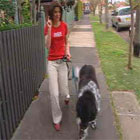Breed:
Newfoundland Temperament:
placid, affectionate and eager to please Cost:
from $1000 Lifespan:
10-12 years Maintenance:
high Recommended for:
large families, cool-temperate climates
One of the heaviest and most loving dog breeds in the world, the Newfoundland thrives on the company of people. Known as the gentle giant, it is a very placid breed despite its imposing size. This giant breed can suffer from arthritis in later years, and with all that hair, grooming is a constant task. The large jowls also ensure a constant supply of saliva and drool.
History:
The Newfoundland is the namesake of the eastern coastal region of Canada, coincidently right next to Labrador. During the 17th century, the breed was used as a working dog, hauling small carts and sledges and dragging fishing nets. In the 19th century the dogs became popular in England and were named by George Cartwright. The breed has a reputation as being intrepid rescuers and helping fishermen by carrying lines from one boat to another.
Appearance:
Considered a giant dog breed, males reach a height of 70cm (28 in) and a weight of 67kg. Bitches reach 65cm (26in) and weigh between 50-60kg (110-130lb). Newfoundlands are usually jet black but chocolate brown, or white with black markings (known as the Landseer) is also evident. They have a massive skull, a short square muzzle, small, tight-rimmed, widely-set eyes and ears that lie flat to the cheek.
Temperament:
Newfoundlands are loyal and courageous with above average endurance and working ability. They are people-oriented dogs and shouldn’t be left alone for long periods in the backyard. The Newfoundland is incredibly placid, patient and tolerant, and very good with children. However, because of their large size and strength, the breed shouldn’t be left unsupervised with young children.
Health and Lifespan:
Newfoundlands can suffer hip dysplasia and osteochondrosis dissecans (OCD), a disease that affects the structure of the bone cartilage. Other health problems may include lip fold infections, eyelid disorders, heart disease and, among older dogs, arthritis. Newfoundlands cannot tolerate the heat and require cool shelter and plenty of water. Expected lifespan is between 10-12 years. Puppies should be wormed every three weeks for the first six months, then quarterly until they are 12 months old.
Feeding and cost:
Giant breeds need specific balanced diets that allow for adequate nutrition without providing too much bulk. They will continue to grow until 18 months of age and require a diet that is low in calcium and low in energy. Don’t allow puppies to become overweight because this strains their bones. It costs at least $15 a week in feed and a Newfoundland costs from $1000, depending on its breeding an the state of purchase.
Breeding:
Newfoundlands usually experience no whelping problems. Bitches are excellent mothers. An average litter size is between 8-10 pups.
Space and exercise:
Although Newfoundlands are content to laze around the house, they need at least half an hour exercise each day. However when exercising a growing pup, keep it light. Ball chasing and stick chasing can place undue strain on growing bones. Short walks will suffice. Excessive exercise and feeding can cause joint problems later on in life.
Maintenance:
High maintenance. If the Newfoundland isn’t groomed for at least an hour a week, the coat can become very knotty. Breeders advise brushing the coat because the dog is difficult to bath however the Newfoundland’s dense, coarse, oily coat encourages dirt to stay on the surface, making it easier to care for. The coat should be cleaned with a short stiff bristled brush, brushing in either direction.
Trainability:
Because of their size and weight it is vital Newfoundlands are trained before they reach full size. They are intelligent, gentle dogs and learn better from patient instruction rather than bullying.
Ideal Owner:
The ideal owner should treat the Newfoundland as part of the family and give the dog plenty of love and attention.
Breeders
NSW
Newfoundland Club of NSW Inc
Mrs P. Bowden
Phone: (02) 4845 1226
VIC
Newfoundland Club of Victoria Inc.
Secretary: Julie Keenan
Phone: (03) 5283 1426
WA
Canine Association of Western Australia (Inc)
Phone: (08) 9455 1188
ACT
Australian Capital Territory
ACT Canine Association Inc
Phone: (02) 6241 4404
NT
The North Australian Canine Association Inc.
Phone: (08) 8984 3570
SA
Newfoundland Club of SA Inc
Ms C. Hill
Phone: (08) 8331 9230
TAS
Tasmanian Canine Association Inc
Phone: (03) 6272 9443
QLD
Canine Control Council (Queensland)
Phone: (07) 3252 2661



